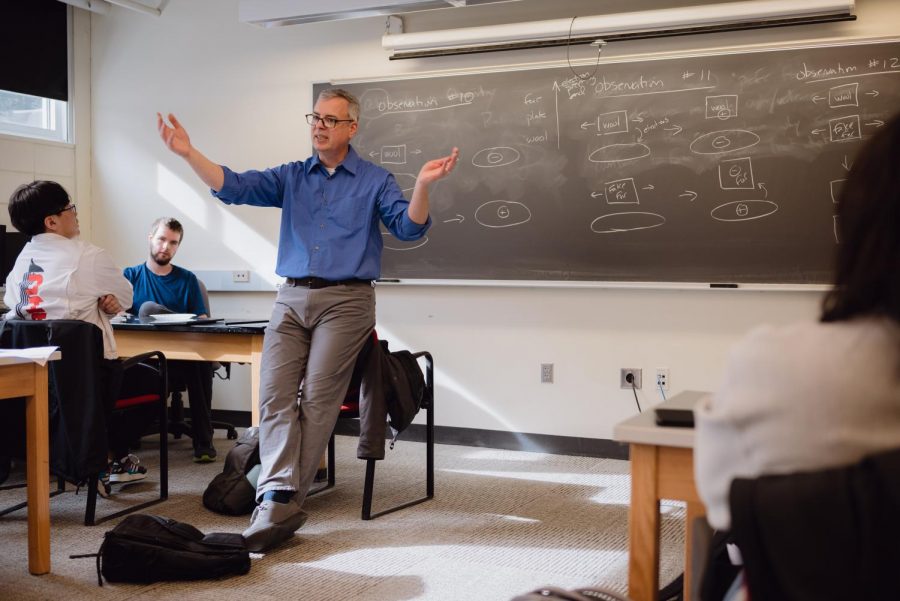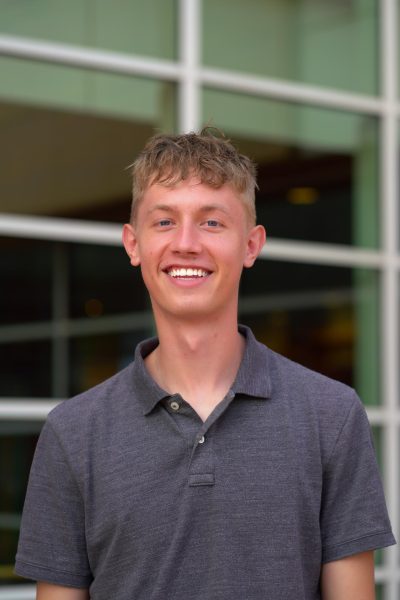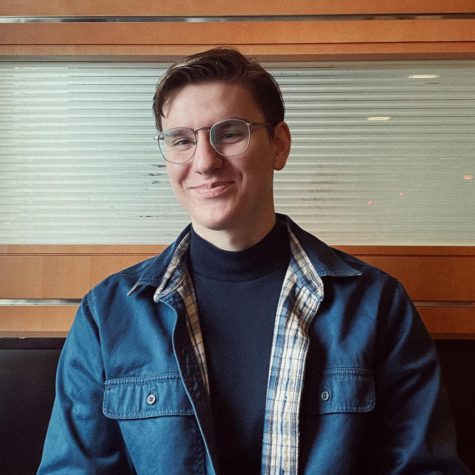Education concentration confirmed for fall 2023
Paul Hutchison, associate professor of education, teaches How To Learn Physics, a class cross-listed as physics and education.
February 13, 2023
Beginning in fall 2023, students will finally be able to register for classes in the education studies concentration. On Dec. 5, faculty voted 79-4 in favor of adding the new concentration. The proposal, spearheaded by Deborah Michaels, professor of education, reflected a decade of deliberation about the addition of a new education program.
Evidence of significant student interest was integral to the proposal’s success. In March 2021, a campus-wide email survey sent by the education Student Educational Policy Committee (SEPC) indicated that 72 of the 180 respondents would “seriously consider pursuing a concentration in Education Studies.”
The high rate of graduates puruing education careers also contributed to the addition of the new program. For the 2020 graduating class, 11% entered education-related professions, making it the third most common career path behind “computing/technology” and “research/science,” according to the Dec. 5 faculty meeting minutes.
“The concentration was a logical step considering the popularity of the education department,” said Elia Dewey `23, a member of the education SEPC. “Many course sections are completely full. This step helps accommodate the overwhelming enrollment.”
Between 2015 and 2018, there were 55 students who completed at least 16 credits in education. The proposal, created by dozens of professors across departments, argued that many of those students would have completed a concentration had it been available. “I think there were a lot of students who were hesitant to take upper-level education classes because there was no credential to acknowledge their efforts,” said Dewey.
Sarah Purcell, professor of history, who contributed to the proposal, said she believes that the concentration is a necessary complement to the teacher certification program. “It is a way for students who aren’t seeking certification to show the world, on their transcript and resume, that they completed an interdisciplinary course of study.”
Dewey, who has taken six education courses, attested to the interdisciplinary nature of studying education. “Whether you’re going into teaching or not, education offers insight into how to interact with people in constructive ways. It can apply to any field from policy to nonprofit work.”
The concentration has a particular eye toward diversity and inclusivity, according to education professor Cori Jakubiak, who chaired the education department until December 2022. “K-12 teaching tends to attract people for whom the school system worked well.”
“Teacher education has tended towards demographics that lean middle-class, white and female-identifying,” said Jakubiak. “Adding an education studies credential system is a way to encourage students from different backgrounds to realize the possibilities that studying education affords.”
Of Grinnell College’s 16 peer institutions, defined by their similar size and level of academic rigor, 10 offer either a major or minor in education. Washington and Lee University is the only other school that offers a licensure program but no education major or minor. Purcell said she thinks that Grinnell College’s decision to keep pace with peer schools is coming at a critical time.
“Because there’s so much controversy around ideological battles that impact K-12 education,” said Purcell, “Anything that Grinnell College can do to help students equip themselves to participate in society, as effective educators, parents or citizens, is important terrain in U.S. society.” Emma Kushnirsky `26, who plans on completing the concentration, noted that the politicization of education makes the introduction of the concentration especially timely.
“Education and teaching are inherently political. If you omit some- thing, then that’s a political decision. Same for if you add something in. Curriculum decisions are increasingly relevant,” said Kushnirsky.
The concentration’s proposed credit structure stipulates a mini- mum of 22 credits. A minimum of 14 credits must come from with- in the education department, one school practicum course, two electives and a capstone experience. The additional credits can be fulfilled through a diverse range of classes offered in all divisions.
All students who complete the licensure program will automatically meet the concentration requirements. The concentration chair will be chosen later this spring through internal appointment, and the education department is compiling professors who are willing to be advisors.
“With the opportunity to study education critically through the concentration, hopefully that will help people see it as a critical field that is never stagnant,” said Kushnirsky.



















































